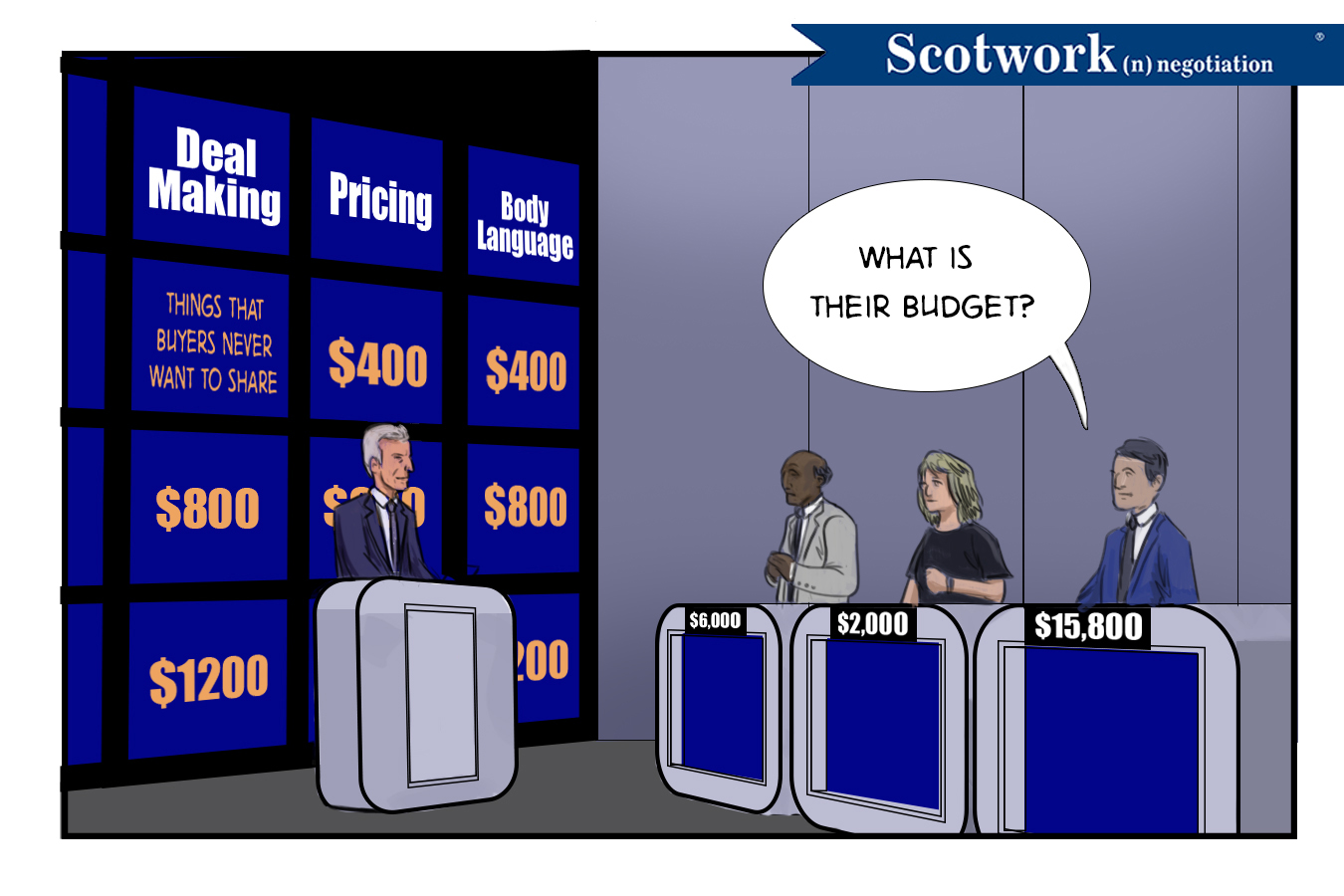Here’s one of the most common questions asked of buyers: “What’s your budget?” The most common answer? You guessed it: “I’m not going to tell you.” I get why this happens. Buyers are afraid that if they share their budget, then the seller’s quote will be exactly that number. We see it happen all the time, so I understand the fear. However, the alternative to not sharing the budget is that the bid process gets elongated, sellers get frustrated, and buyers don’t get what they want. Ironically, buyers eventually do share their budget, which is when deals typically get done. So, why go through all the pain? You don’t have to! Here are some different ways to answer that question.
Be Proactive
I’m a proponent of getting the bad news out upfront. You can predict that someone will ask for your budget. If you’re not ready to give it, tell them before they ask. Don’t leave them guessing. However, I don’t recommend waiting till you say, “Yes, we have deal” to reveal your budget. Instead, leverage the information to understand what options are available and to help validate your budget requirements.
Say something simple like, “Before we talk details, I want you to know that we don’t have a budget finalized yet. Therefore, in this part of the process we are gathering perspectives on how to address our needs along with budget estimates. Afterward, we will finalize our budgets, which we will disclose to you later in the process so that you can create a more specific proposal for us.”
If you lead with a statement like the one above, you’ll more than likely avoid the budget conversation till you’re ready to have it. The other advantage is that it also allows you to see alternatives that you may not have thought about in your solution design. Here’s the trade-off: You need to be open about other parts of your scope, such as timing, quantities, and requirements.
Provide Options
Another alternative to just giving a budget number is giving the seller budget tiers to work with — a “good, better, best” scenario. You can choose to set these options on whatever budget threshold you want, but in the end it will give you a solid perspective on the seller’s cost drivers by seeing the solution at different budget tiers.
Here’s an example: “We have three different budget thresholds we’re looking at. We will determine which budget threshold we will work with based on the benefits of the solution and the timing of the rollout.”
The advantage of this approach is that it will give you an indication of what drives prices. (Is it volume? Is it length of commitment? Is it sequencing?) It will also show you how the seller is thinking about your need and how their solution will address it at the different tiers. All of which is helpful in the vendor selection process.
Tell Them
As we tell dealmakers all the time, you will not get what you want unless you ask for it. Why play the guessing game? We play it because we’re afraid the sellers will run to your limit. In the absence of any other information, sellers will run to your limit. It’s up to you to structure their expectations and provide them with context for your budget.
This approach has been very effective in competitive-bid scenarios: “Our budget for this project is $XXX. We will be selecting a seller who best meets our needs while staying well under the budget threshold for this project. We will be using excess budget to either reinvest in this relationship or help fund other initiatives that we have planned.”
This sets an expectation: Going to your limit is not a good thing. It’s also a different way of saying, “Being cost-competitive matters.” This works even better if you’re prepared to ask a lot of in-depth follow-up questions to make sure you understand the cost drivers of the solution and how they impact your needs. But the biggest advantage to you is that this method gets the budget number out there and will reduce the amount of time wasted by everyone trying to guess it.
All three options are viable. Which one you go with depends on your circumstances. In the end, it’s up to you to set and manage expectations. Don’t make people guess what you have in mind — that only leads to frustration on the part of both parties and elongates the entire process.
Need help on what to share?
If you don’t know how to answer the hard questions or you are concerned about sharing too much, then give us a call. We can be your advisor, your coach, and your trainer. Whether you bring us in to create your strategy, or help you prepare, or develop your team’s negotiating skills - we can help you win at the negotiating table.
We’ve been consulting and teaching our proven negotiation methodology for over 40 years. We know the process, we can identify the skills required, and we have the techniques to negotiate better deals for you. Call us and let’s discuss what we might be able to do for you.

